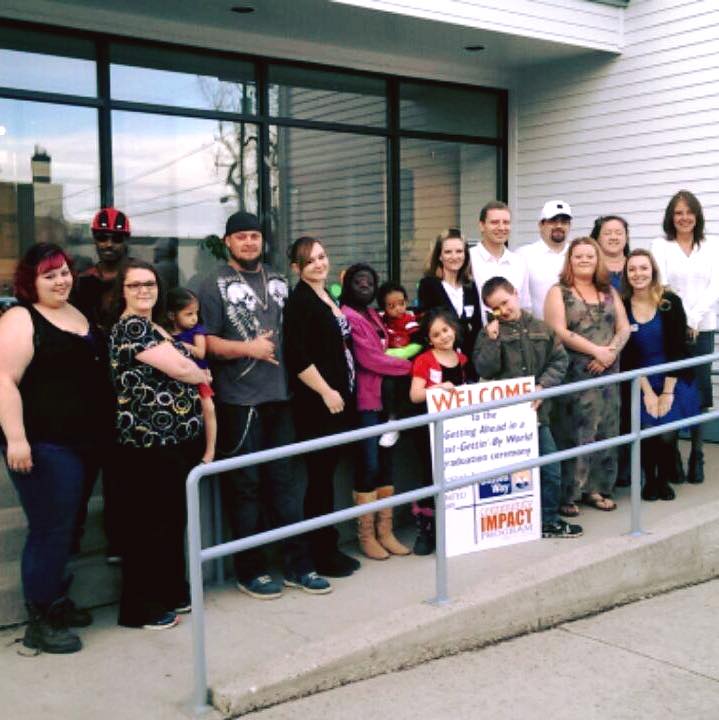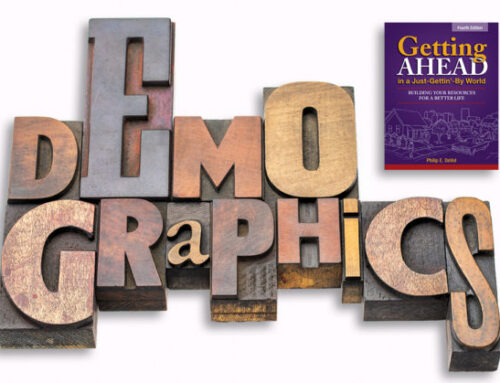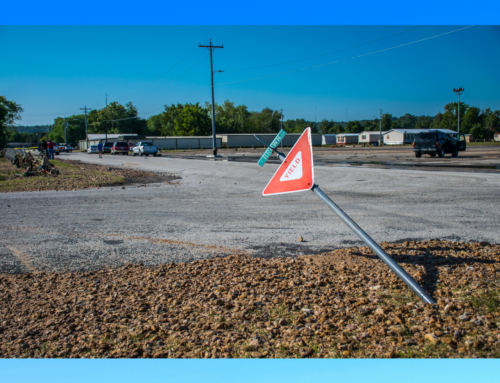 by Betsy Foos
by Betsy Foos
The following was inspired by Kelly Bays, Jordan Harmon, Danae Hicks, Cathy Joslin, Roscoe Lofton, Thomas Mathers, Aristel Nopee, Laura Oatman, Justin Shinn, Ashleigh Watson, Rick James Wieland, and L. J. Williams.
I would like to thank everyone—family, friends, and community leaders—for supporting my fellow Getting Ahead graduates and me on this occasion.
As I sat in my car before my first Getting Ahead class, I cried. I asked myself, as I had so many times before, what had I done so wrong in my life to sink so low.
I managed to pull myself together and walked into class. I am embarrassed to admit this now, but as my classmates entered, I wondered what they had done to be in the same lowly spot in life I found myself in.
Sadly, I know I am not the only person who thinks—or thought—like this. I see the same pity and condemnation in the eyes of those who learn my predicament.
Before I started Getting Ahead, I referred to myself and those like me as “poor.” And I equated my entire life—my self-worth—with “poor.”
As our classes got under way, we became investigators about being “poor.” I got to know the people who were part of this journey. I learned many things from this class, and I encourage everyone to take this learning opportunity. However, I learned much more from the people.
There is absolutely nothing “poor” about my classmates. These people are smart, talented, funny, classy, beautiful, wonderful souls … each one with something special inside them, waiting for the world to look past their financial shortcomings to be able to show the absolute wealth they each are.
I was surprised about two weeks ago when I left class feeling good about who I am. That is a feeling I had forgotten long ago, about the same time I became “poor.” The Getting Ahead class and these outstanding people had reminded me of who I really am. I finally realized that my self-worth is not equivalent to my empty piggy bank. For that I will be forever grateful.
I now ask everyone in this room to stop using the word poor to describe those of us with money issues. I like financially challenged, but you can use your own …
The point is, being financially challenged is difficult enough, but being judged and labeled because of it can make changing almost impossible.
The Getting Ahead investigators in my class, as are all GA investigators, were forced to look at all aspects of poverty, including, of course, our individual issues.
However, we learned our community also plays a part in our situations. And, as such, we have been challenged to find those problems and make changes where possible.
We salute the many agencies that are here every day to help us through, including the Community Budget Center, Love INC, and so many other wonderful organizations and people too numerous to list. We all owe you more than our undying thanks.
But these organizations can only do so much. And our investigations taught us that as wonderful and as necessary as they are, they are known as “getting by” resources. They help us out in a pinch, so to speak.
We, this community, need to work on “getting ahead” resources—those resources that can help the financially challenged take charge of the monetary portion of their lives.
Believe me, not very many people prefer sitting in the food bank line for three hours rather than using their skills and talents to bring home food of their choosing and to be able to bring it home with pride.
Yes, we need help. And help is always hard to ask for, especially when money is concerned. It is viewed as asking for handouts or charity.
The real problem is we, the financially challenged, don’t know how to fix the long-term problems. That’s where we really need help.
I recently saw a movie called Pay It Forward. I won’t ruin it for those who haven’t seen it, but the basic premise is that each person must do something to change three peoples’ lives for the better. And each person who has their life changed must do the same for three others, and so on.
We in no way can change poverty or our community overnight. But maybe, by helping the individuals one by one (or three by three), we can change how we see poverty.
We are all affected by poverty. It is a cancer in our world, and it has been ignored far too long, allowing it to grow to lethal levels. And also like cancer, poverty can strike anyone at any time without warning.
I challenge each of you to “pay it forward” to three people. How can you help someone find financial independence without giving them money?
Our community is full of heart, and I believe that with some direction, we can help the financially challenged.
As business owners, could you find a way to offer training or an apprenticeship program? Could you team up with the Workforce Center to have them offer vocational courses you would hire from? How about scholarships for employees? Or could you actually pay for the education of a future employee? As an employer, the pay it forward concept could also be a very good way to build a strong and loyal staff.
As people, could you fix your neighbor’s car so they can make it to their job? Could you loan or give a friend an outfit to wear for a job interview or watch their kids during said interview? Maybe you could help your cousin create a budget or show them how to balance their checkbook?
What do they need, and what can you do? The list of possibilities is endless! But most of all, we can allow self-worth and self-esteem to equal the person, not their bank account.
To my fellow graduates, my friends, my new family: It has been my honor to go on this adventure with such truly superb humans. I could never show how grateful I am to each of you for giving me back the most important thing I had lost: my own self-respect.
Lastly, I must acknowledge Miss Aspen Matthews. This lady brought us all together, and even when we tried to fall apart, she kept us going. Lady, you have earned my admiration and my respect. You have touched and inspired us all.
Again, thank you all for coming tonight. And, being financially challenged, I must say, please, no applause, just throw money!
Betsy Foos is one of 12 graduates of Moffat County United Way’s most recent Getting Ahead group. Moffat County United Way has graduated five Getting Ahead groups in the last three years as part of its Bridges Out of Poverty initiative. You can read more about Betsy’s group in this article from Craig Daily Press.








